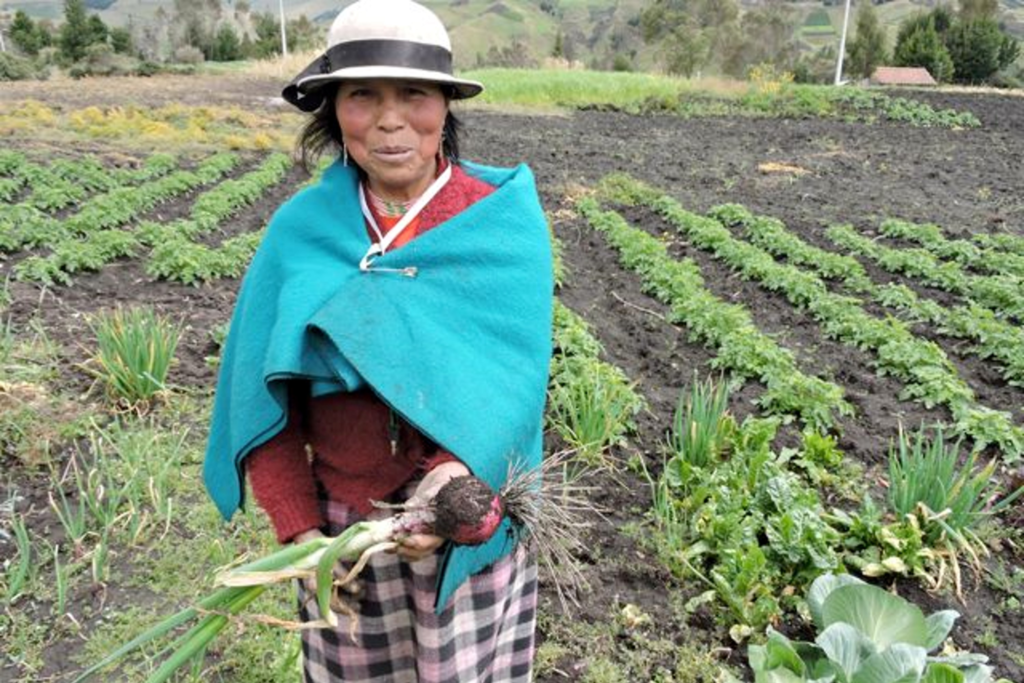

The rural areas of Ecuador’s Chimborazo province, where the Indigenous population is concentrated, are particularly underserved by public services, including health, education, and water and sanitation. The poverty, malnutrition and illiteracy rates there are among the highest in the country.
In response to this situation, Development and Peace has been working for almost 25 years with its local partner, the Centro de Desarrollo, Difusión e Investigación Social (Center for Development, Dissemination and Social Research – CEDIS) to improve the living conditions of the Kichwa communities by focusing on food sovereignty, citizen participation and gender equality. CEDIS is a key player in supporting organizational processes and building the capacity of local and regional organizations.
During the COVID-19 pandemic, the Kichwa communities faced additional challenges. In particular, the lockdown measures undermined informal employment, and the subsequent drop in household income further compromised their food security. Development and Peace’s support for CEDIS in 2020–21, through our COVID-19 Solidarity Fund, made it possible to quickly distribute seeds to ensure gardening activities continued, thus reducing food shortages for families in lockdown.
Thanks to CEDIS, I received all kinds of seedlings for my family garden, such as spinach, lettuce, cabbage, broccoli, onions, carrots and beets. Because the harvest coincided with the start of the pandemic, we could continue feeding ourselves without having to go shopping in town. — María Pucha, member of the community of La Pradera, Ecuador
Continuing in 2021–22 thanks to the financial support of the Roncalli International Foundation, the now-completed project Strengthening the Resilience of Rural Kichwa Communities during COVID-19 has accomplished the following major outcomes in its three areas of intervention:
- The food security and immune systems of the inhabitants of the Indigenous communities have been strengthened: Thanks to the provision of vegetable seeds and seedlings and the organization of local farmers’ markets, the 860 families participating in the project now have a permanent supply of healthy vegetables, produced without chemicals using agroecological practices. They also benefited from workshops aimed at raising their awareness of the negative impact of junk food and carbohydrates (sugary drinks, sweets, etc.) on their health and to learn recipes for healthy, nutritious and balanced meals. Special emphasis was placed on child and youth nutrition.
- Vaccination against COVID-19 is generalized among people 65 and older, and there are stronger preventive measures in the communities: Thanks to a sustained awareness-raising campaign (driving tours, community meetings, distribution of flyers, and WhatsApp and Facebook messages), communities suspended their meetings and mass events during periods when there was an increase in cases. The use of masks and social distancing also improved, and data collected from people 65 and older was provided to Ministry of Health medical centers, which conducted targeted vaccination campaigns in the communities.
- Housing conditions and access to water have improved: Under a technical partnership with the Department of Civil Engineering at the Pontifical Catholic University of Ecuador (PUCE), the housing conditions of five communities were diagnosed, revealing serious problems. The communities were thus able to present the government with a prototype for the construction of new housing suitable for areas above 3,400 metres. In addition, as a result of the proposals presented by the communities to the decentralized autonomous governments, some of them benefited from improvements to their drinking water systems. Lastly, as part of the project, 80 washbasins (63 family sinks and 17 community washbasins) have been installed to reinforce good hygiene practices.
Development and Peace is proud of this project, which has improved the food security, living conditions and access to health services of Indigenous communities in Chimborazo, Ecuador. Through projects such as this one, Development and Peace is strengthening the long-term food security of Indigenous and other vulnerable communities in the Global South, while fostering inclusive resource management and upholding their economic, social and environmental rights.

